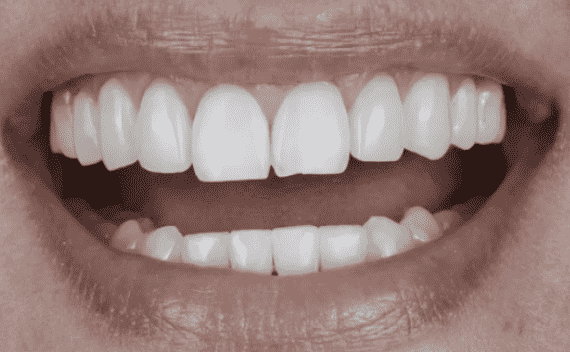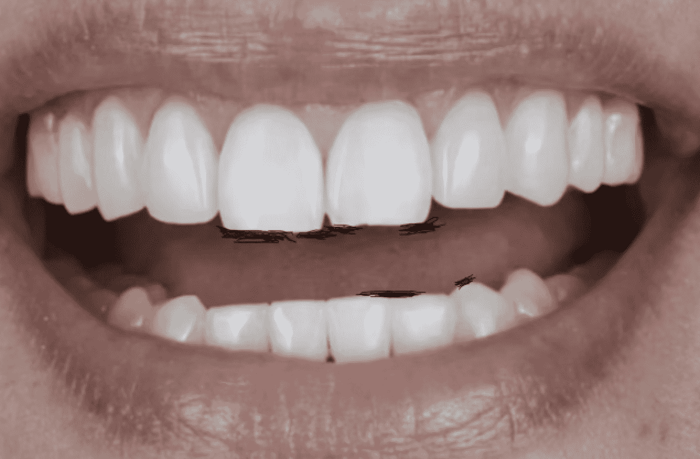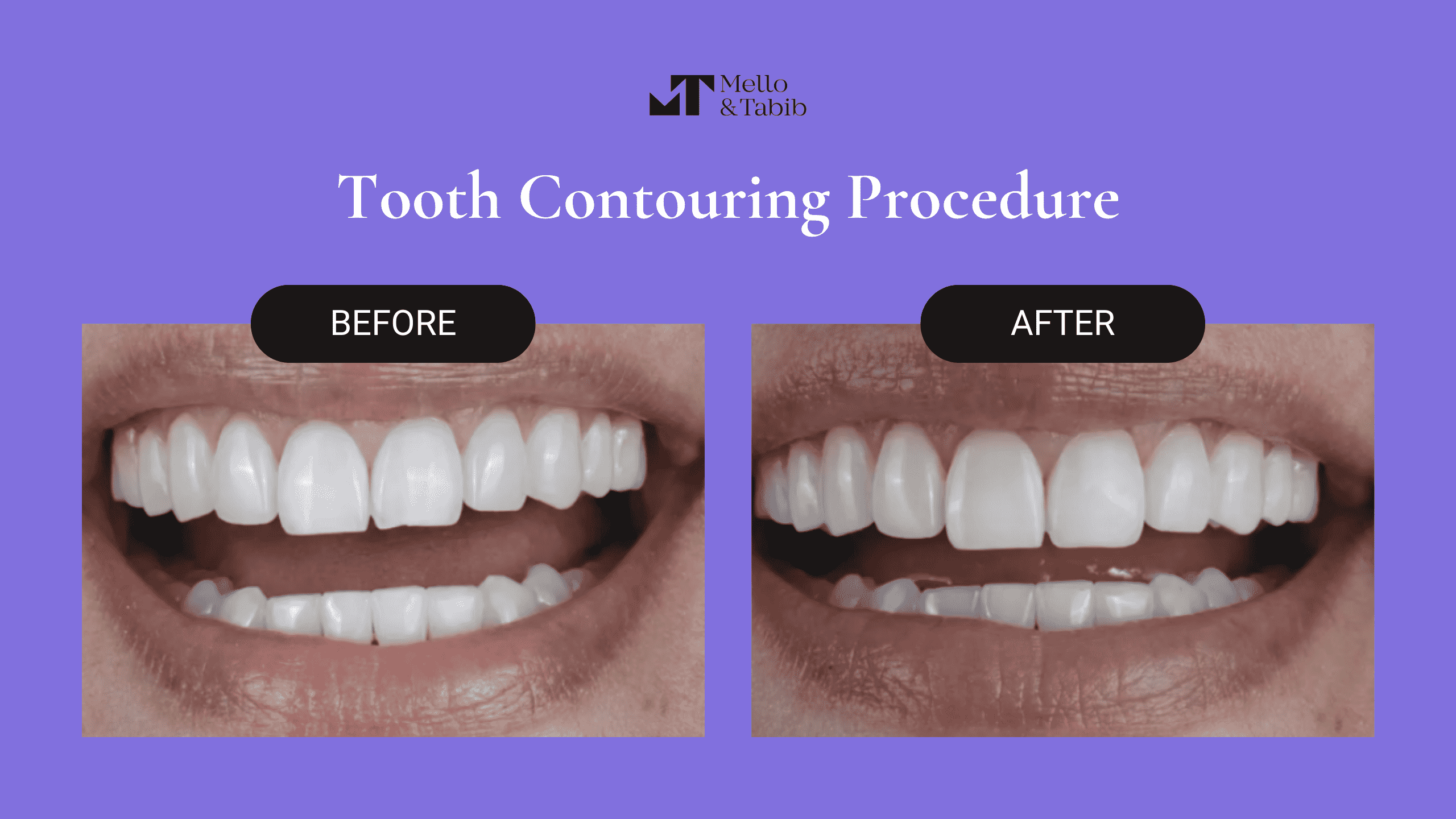
Tooth contouring has quickly become a popular choice within the realm of cosmetic dentistry for those looking to enhance their smiles. This rising interest often brings up a common question: Does tooth contouring cause discomfort?
At NYC Smile Design, we've noticed an uptick in inquiries about this procedure, particularly regarding the comfort level during treatment.
This blog seeks to address such queries, offering insights into what one can expect in terms of discomfort during tooth contouring.
Understanding Tooth Contouring
Tooth contouring, also known as dental reshaping, and technically known as enameloplasty, is a cosmetic procedure designed to alter the shape and appearance of the teeth. This minimally invasive treatment stands out for a few important benefits: it enhances the aesthetic appeal of the smile, improves dental function without requiring extensive procedures, and, most importantly, will not require future replacement. It's a conservative and artful approach to fine-tuning the smile, addressing minor imperfections such as slight overlaps, small chips, minor bite problems, or irregularly shaped teeth.
The Process of Tooth Contouring
The journey of tooth contouring begins with a thorough assessment of your dental structure, where your dentist evaluates the overall harmony of your smile and identifies the specific areas that can benefit from subtle modifications. The modifications can be simulated with the use of a black marker to show what your tooth will look like if the area marked in black is contoured. (See image below) The actual procedure is characterized by the careful removal of minute amounts of tooth enamel, the outermost protective layer of the teeth, to reshape and smooth out imperfections. This step is meticulously performed, ensuring precision and a gentle touch to achieve the desired outcome—a more uniform and aesthetically pleasing smile.

Despite its transformative potential, tooth contouring is celebrated for its simplicity and efficiency. Typically, the procedure requires just one visit to your dentist, making it an attractive option for those seeking immediate improvements without the downtime associated with more invasive treatments. Additionally, because the focus is on removing the least amount of enamel possible, there is remarkably little discomfort and no need for any local anesthesia or numbing. Patients frequently describe the procedure as being completely pain-free.
By embracing tooth contouring, individuals can address a range of minor dental flaws, from smoothing out chips and rough edges to reshaping slightly overlapping or irregularly shaped teeth, thereby enhancing the uniformity and overall aesthetic of their smile. This detailed approach to cosmetic enhancement underscores the importance of consulting with seasoned dental professionals at NYC Smile Design, who can guide you through the process and ensure that your vision for a perfect smile is realized with utmost care and precision.

The Reality of Pain in Tooth Contouring
Understanding the true nature of discomfort during tooth contouring can help alleviate concerns for those considering this cosmetic procedure. Modern dentistry has made significant strides in minimizing discomfort, transforming tooth contouring into a virtually painless experience. The process primarily involves the gentle removal of a minimal amount of tooth enamel to reshape and smooth the tooth’s surface. Because enamel does not have any nerve endings, the procedure generally does not elicit pain. However, mainly to reduce anxiety, ensure patient comfort, and reduce the pressure sensation of the instruments as they are adjusting the tooth, a topical anesthetic cream can be applied. Today’s topical anesthetic creams are quite effective; they can produce a significant amount of numbness for a very short window of time. This makes it ideal for enamel tooth contouring. This proactive approach to anxiety and pain management reflects the dental community's commitment to patient-centric care, prioritizing comfort and minimizing anxiety associated with dental treatments.
Managing Discomfort Effectively
Following tooth contouring, the emphasis on post-procedure care is instrumental in ensuring a smooth and comfortable recovery. Notably, many patients report experiencing no pain after the procedure, highlighting the minimal invasiveness and advanced techniques utilized during contouring. To address any temporary sensitivity that may arise, dental professionals often recommend over-the-counter pain relievers, tailored to manage discomfort without the need for stronger medication. Furthermore, patients are guided through optimal oral hygiene practices aimed at preventing irritation and facilitating swift healing. This includes gentle brushing with a soft-bristled toothbrush and the use of non-abrasive toothpaste, along with rinsing with a soothing, alcohol-free mouthwash to keep the area clean and free from potential irritants.
Post-Contouring Care: Recommendations for a Smooth Recovery
After undergoing tooth contouring, we provide several recommendations to ensure your comfort and protect your newly contoured teeth. These suggestions are designed to minimize discomfort and safeguard against unnecessary stress or additional damage, ensuring the longevity of your smile transformation.
- Refrain from Using Teeth as Tools: Avoid habits that place unnecessary strain on your teeth, such as biting fingernails, chewing on pens, or using your teeth to open packages. Often these habits are the reason why contouring is needed. These actions can compromise the integrity of your newly shaped teeth-you do not want to chip them again.
- Follow Your Dentist's Specific Recommendations: Depending on the details of your tooth contouring procedure, your dentist may have additional personalized advice. Adhering to these guidelines will aid in your recovery and help maintain the results of your contouring treatment. These recommendations can include nightguards or retainers to protect your teeth at night.
- Be Mindful of Temperature Sensitivity: Some individuals may experience temporary sensitivity to extreme temperatures. It's advisable to avoid overly hot or cold foods and drinks to prevent discomfort during the initial recovery period.
- Practice Gentle Oral Hygiene: While maintaining oral hygiene is crucial, being gentle is equally important and is a good overall general practice. Use a soft-bristled toothbrush and non-abrasive toothpaste when cleaning your teeth. Additionally, avoid aggressive brushing around the contoured areas to prevent irritation.
- Avoid Hard Foods: Directly following your procedure, it's wise to steer clear of hard, crunchy, or chewy foods that could exert excessive force on your teeth. Opting for softer foods can prevent any potential damage to the contoured areas and reduce the risk of irritation.
- Limit Staining Substances: Beverages and foods known for their staining capabilities, such as coffee, red wine, tea, and certain sauces, should be consumed with caution. While tooth contouring primarily affects the shape of your teeth rather than their susceptibility to stains, maintaining your smile's brightness is still essential.
By following these post-procedure recommendations, you can contribute significantly to a quick and comfortable recovery, ensuring the longevity and success of your tooth contouring results.
Consultation with a Professional
Tooth contouring stands out as a testament to the advancements in cosmetic dentistry, offering a minimally invasive route to aesthetic enhancement with a strong emphasis on patient comfort. By demystifying the reality of pain associated with the procedure and highlighting effective strategies for managing discomfort, individuals can approach tooth contouring with confidence and peace of mind. The professional guidance provided during the consultation phase further enriches the patient experience, ensuring a clear understanding and a personalized approach to achieving the desired smile transformation.

Your Dental Choice
Tooth contouring is typically not considered painful. Through the use of contemporary dental practices and effective pain management, any potential discomfort is manageable, minimal, and temporary. Patients interested in this procedure are encouraged to openly discuss their concerns with their dentist, allowing for an informed decision-making process.
Are you considering tooth contouring as a way to improve your smile? Schedule a consultation with NYC Smile Design for a comprehensive evaluation and to address any questions you might have. Our team is committed to ensuring your cosmetic dental journey is as comfortable and well-informed as possible.
Topics:

